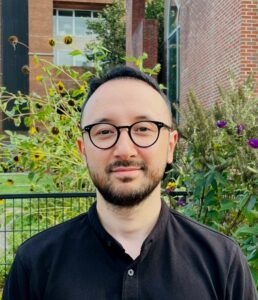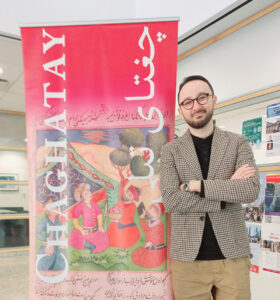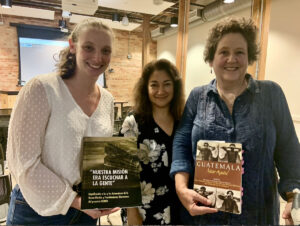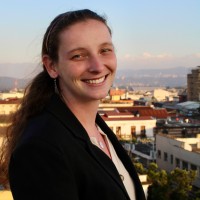Graduate Student News
Meeting with a Promising Young Central Asianist, Winner of Newcombe Fellowship
 Nurlan Kabdylkhak is a Ph.D candidate in History at UNC at Chapel Hill. His research focuses mainly on the social and cultural history of Central Asia.
Nurlan Kabdylkhak is a Ph.D candidate in History at UNC at Chapel Hill. His research focuses mainly on the social and cultural history of Central Asia.
Q: Can you provide us with a short educational and professional background of yours?
A: From my earliest memories, history has always captivated me. As a child one tends to have a very romantic understanding of history. As someone who was born and raised in Kazakhstan, my love for history was ignited and shaped by tales of mighty khans and legendary historical figures of Central Asia. Whether it was the indomitable Saka Queen Tomyris defeating Cyrus the Great, the world-conquering Genghis Khan, or the last all-Qazaq sovereign, Kene-Sary, each narrative resonated with me.
It was not until my pursuit of a master’s degree in International Area Studies at Tsukuba University in Japan that I rediscovered my profound passion for Central Asian history. In the library, I stumbled upon the works of the late historian Yuri Bregel and Devin DeWeese, which revolutionized my understanding of Central Asian history. Their innovative approach to historical scholarship – creative and informed by sources in multiple languages – transformed my understanding of the field. Their contributions opened my eyes to the burgeoning realm of Islamic Central Eurasian studies. This intellectual journey ultimately led me to a pivotal decision: to pursue academic history to become a professional historian.
Q: You have been awarded the Charlotte W. Newcombe Doctoral Dissertation Fellowship for 2023, which is a very prestigious fellowship. Can you tell us about this fellowship, how did you come across it, and what is its significance for you and your work?
A: Before arriving at UNC, I curated a list of grants and fellowships to pursue during my graduate studies. The Newcombe Fellowship, in particular, captured my attention, as it is specifically designed for Ph.D. students exploring the realms of religion and ethics across diverse contexts. Given that my research focuses on the evolution and governance of religious institutions in colonial Central Asia, the Newcombe Fellowship seemed like an opportunity I should not miss.
I am honored to be among the 21 scholars selected for the Newcombe Fellowship this year. I extend my sincere gratitude to both the Charlotte W. Newcombe Foundation and The Institute for Citizens & Scholars, which administers the award, for their unwavering support and for providing me with the opportunity to devote myself entirely to my dissertation over the course of this academic year.
Q: Could you tell us a little about your dissertation project? What is it about?
A: My dissertation project delves into the dynamic social and political history of Muslim religious institutions in the colonial Kazakh steppe. In the early 19th century, this vast territory, spanning over a million square miles, housed only a few permanent mosques and a scattering of Islamic scholars. Yet, by the turn of the century, it had transformed into a vibrant hub of Islamic culture. Notably, the city of Semey alone boasted eleven mosques, nine Islamic colleges (madrasas), and a dynamic network of religious scholars (‘ulama), who fostered connections beyond regional, imperial, and ethnic boundaries, linking the steppe with Central Asia, the Volga-Urals, Qing Xinjiang, and the Ottoman Empire.
My research scrutinizes this period of profound change, often described by scholars as an Islamic transformation or Islamic revival on the Kazakh steppe. My goal is to unravel how tsarist Muslim subjects organized their communities, expressed their religious and ethnic identities, and established, financed, staffed, and defended their institutions against the backdrop of the imperial state.
An integral aspect of my work involves bringing Muslim and specifically Kazakh-language sources to light. By amplifying these voices, my research possesses the potential to reshape existing scholarly narratives, presenting a more nuanced portrayal of tsarist Muslims and their responses to the challenges and opportunities arising from Russian imperial expansion into Central Asia.
 Q: You taught some courses at UNC. Can you tell us what did you teach?
Q: You taught some courses at UNC. Can you tell us what did you teach?
A: As a teaching assistant, I had the opportunity to lead recitations for courses including “The World since 1945,” “Modern Central Asia,” and “History of Muslim Societies since 1500.” Guiding students through diverse subjects taught by different scholars proved to be an incredibly enriching experience. The exposure to various scholarly literatures, often beyond my immediate field, expanded my intellectual horizons, while working alongside UNC history professors helped me to enhance my pedagogical skills and grow as an educator. I had the fortune of collaborating with esteemed professors such as Cemil Aydin, Max Owre, Donald Raleigh, and Eren Tasar, whose mentorship imparted invaluable insights.
More recently, I taught my own course on Russian history, covering late imperial and Soviet eras. Receiving overwhelmingly positive feedback from my students in the end of the course has been gratifying, and I hope that this class met their expectations.
Q: Last year, you were outside the US for a research leave. Can you share with us some of your research and travel experiences?
A: To gather materials for my dissertation research, I travelled to archival institutions in Russia and Kazakhstan. My initial destinations were Kazan and Ufa, pivotal centers of tsarist-era Islamic learning and governance. There, I delved into Muslim manuscripts, periodicals, and the records of the tsarist Muslim Spiritual Assembly, which oversaw the legal and religious matters of Muslims in Imperial Russia.
Afterward, I continued my research in St. Petersburg at the Russian State Historical Archive (RGIA). My primary focus at RGIA was on the documentation of the tsarist Ministry of Internal Affairs, particularly its Department of Spiritual Affairs of Foreign Confessions—the supreme imperial authority managing the religious affairs of Russia’s diverse non-Orthodox communities. Finally, in Kazakhstan, my research was concentrated at the Central State Archive (Ortalıq Memlekettik Arkhiv), where I studied numerous documents that shed light on the evolution and governance of Islamic institutions across the Kazakh steppe.
Q: What would you advise for the prospective fellowship applicants?
A: It may not seem like a particularly original piece of advice, but starting the preparation of your application well before the deadline is essential. This approach allows you to craft multiple drafts of your application until it represents your qualifications and intentions most effectively. It’s also crucial to have your friends and colleagues review your materials. Being an expert in your field, you may easily overlook certain details that have become second nature to you. By sharing your application with others, you can gain insights that will help you clarify and expand upon aspects that may be ambiguous to fellowship committees. Ultimately, the goal is to present a clear and compelling narrative to your prospective readers, avoiding any potential confusion.
-Burak Bulkan
PhD Candidate Emily Taylor: History meets community in Chapel Hill and Guatemala
 UNC Ph.D candidate Emily Taylor has learned a lot over the course of her doctoral studies. She is an expert in the history of the Civil War in Guatemala, a conflict that spanned from 1960 to 1996 and continues to have a ripple effect on the country to this day. Emily has also become well-versed in many other aspects during her PhD, including community building and engagement in both Guatemala and here at home in Chapel Hill. She spoke to me about how her work in the community at home and abroad has enriched her studies.
UNC Ph.D candidate Emily Taylor has learned a lot over the course of her doctoral studies. She is an expert in the history of the Civil War in Guatemala, a conflict that spanned from 1960 to 1996 and continues to have a ripple effect on the country to this day. Emily has also become well-versed in many other aspects during her PhD, including community building and engagement in both Guatemala and here at home in Chapel Hill. She spoke to me about how her work in the community at home and abroad has enriched her studies.
Emily’s research mainly focuses on women’s political activism during the Guatemalan conflict, with a focus on social movements and political memory. Her dissertation, tentatively titled “‘We Have Made the Government Tremble:’ Gender and Ethnicity in the Guatemalan Popular Movement, 1976-1996,” centers gender and indigenenaity, as well as the intersection between them in order to better understand the Guatemalan conflict. She was the recipient of a Fulbright Hayes DDRA Fellowship in 2022, which allowed her to spend a year in the field undertaking both archival research and oral interviews. She completed 40 interviews in English, Spanish, and K’iche’, a Mayan language spoken by the K’iche’ people of Guatemala. Emily also spent countless hours in a number of archives on the ground. Her oral interviews included a discussion with the co-founder of the group at the center of her dissertation Grupo de Apoyo Mutuo, which took her almost a year to secure. “I’m really lucky I am able to work on a topic where people are still living so I can ask them about their experiences,” she reflected, “It allows me to access other parts of history that aren’t available in the archive. It’s just so different than a material source.”
One aspect of Emily’s research that brought her closer to the Indigenous communities she studies was her language skills in K’iche’. Through support from UNC and Duke, she was able to begin her language studies in Nahualá in the highlands of Guatemala. Emily cites her experience connecting to the community as one of the most impactful things she has done in the field – “People really appreciate the effort being put in to speak with them in their native language,” she commented, “It also gives me a different perspective on Guatemala and Latin America, and helps me to center Indigenous voices in my work.” When she returned from her studies in Nahualá in 2020, she helped to found a K’iche’ language group that meets once a week to practice the language in conjunction with a teacher living in Nahualá. Emily had already developed a relationship with her teacher in Guatemala, and was able to continue working with her through the utilization of tools such as Zoom to foster remote learning. She cites the cultivation of this language group as a way to build community with other K’iche’ speakers in the United States. Emily is coordinating a speaking tour for her teacher, Ms. Tahay, which will span 6 states including North Carolina. She will be in the Triangle from February 22nd-26th, 2024.
 Upon returning to North Carolina this year, Emily has found ways to engage with her local community using her skills and research experience. While she is currently working on writing her dissertation, she also prioritizes using her knowledge of Guatemala to connect and educate. This fall, Emily was invited to be a speaker at the Rights! Camera! Action! Film Series sponsored by the Duke Human Rights Center at the Franklin Humanities Institute. The annual series highlights films that draw attention to human rights issues, followed by panel discussions to further discuss the important themes of the film. Emily was invited to help contextualize “The Art of Political Murder,” a film about Juan Gerardi, a Bishop who was murdered after reporting the atrocities committed by the state during the Guatemalan Civil War. She joined other human rights expects, including Duke Human Rights Center Director Robin Kirk, on a panel before the film, helping to contextualize the significance of the film and the conflict in Guatemala.
Upon returning to North Carolina this year, Emily has found ways to engage with her local community using her skills and research experience. While she is currently working on writing her dissertation, she also prioritizes using her knowledge of Guatemala to connect and educate. This fall, Emily was invited to be a speaker at the Rights! Camera! Action! Film Series sponsored by the Duke Human Rights Center at the Franklin Humanities Institute. The annual series highlights films that draw attention to human rights issues, followed by panel discussions to further discuss the important themes of the film. Emily was invited to help contextualize “The Art of Political Murder,” a film about Juan Gerardi, a Bishop who was murdered after reporting the atrocities committed by the state during the Guatemalan Civil War. She joined other human rights expects, including Duke Human Rights Center Director Robin Kirk, on a panel before the film, helping to contextualize the significance of the film and the conflict in Guatemala.
Emily has also dedicated her time to working as an expert witness in asylum cases for the UNC immigration legal clinic. The clinic aids asylum seekers by representing them in humanitarian immigration cases with help from expert witnesses in a variety of fields. She cites this work as some of the most impactful she has done, and hopes to use her knowledge to make a difference in someone else’s life. “The immigration system is very hard to navigate and always in flux,” she said “I can use my research skills to hopefully push forward these cases.” Emily’s expertise on the historical context of political conflict in Guatemala as well as current political happenings make her an excellent candidate to speak on these cases – the Civil War in Guatemala continues to have effects on the country that contribute to migration to the United States. By contextualizing situations where there is a threat of harm upon return to Guatemala, Emily is able to help a judge make an informed decision if needed. “It’s heartbreaking to see the many ways that the shadow of the war continues to haunt Guatemala, so being able to give back in some way makes me feel like my work has an impact outside of the academy.”
What’s next for Emily? Besides teaching her own course this Spring and continuing to write her dissertation, she plans on presenting her research findings at the annual Latin American Studies Association conference in Bogotá, Colombia this summer. She has also been working on sharing her expertise with a wider audience, including two online articles published about the recent Guatemalan elections. Above all, Emily is continuing to center her relationships and community engagement alongside her research and writing: “I want to give back in my own way after so many resources were invested into my education. Deep relationships and community are really what ground me in this work.”
-Dani McIvor
Gifts to the History Department
The History Department is a lively center for historical education and research. Although we are deeply committed to our mission as a public institution, our “margin of excellence” depends on generous private donations. At the present time, the department is particularly eager to improve the funding and fellowships for graduate students.
Your donations are used to send graduate students to professional conferences, support innovative student research, bring visiting speakers to campus, and expand other activities that enhance the department’s intellectual community.
 |
To make a secure gift online, please click “Give Now” above.
The Department also receives tax-deductible donations through the Arts and Sciences Foundation at UNC-Chapel Hill. Please note in the “memo” section of your check that your gift is intended for the History Department. Donations should be sent to the following address:
UNC-Arts & Sciences Foundation
Buchan House
523 E. Franklin Street
Chapel Hill, NC 27514
Attention: Ronda Manuel
For more information about creating scholarships, fellowships, and professorships in the Department through a gift, pledge, or planned gift please contact Ronda Manuel, Associate Director of Development at the Arts and Sciences Foundation: ronda.manuel@unc.edu or (919) 962-7266.
